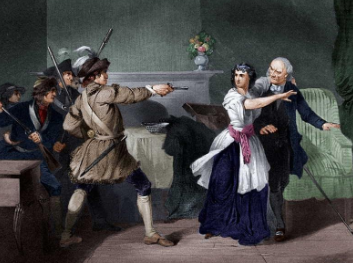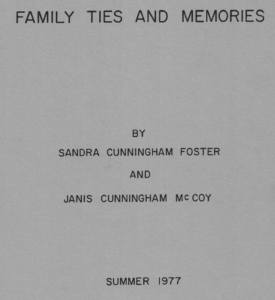The following is from the Springfield Family files of Legacy Keeper Donna Thompson:
A monument, made of stones from Dicey’s fireplace, was erected in Greenville, SC in 1933, in recognition of her efforts during the Revolution. A bronze plaque was added to the monument on 16 October, 1966 by the Nathaniel Green Chapter of DAR. The DAR of Canton, MO named their Chapter for Dicey Langston, as did the “Daring Dicey” DAR Chapter in Vernon, Alabama. There is also a Children of the American Revolution Circle in DeLand, FL named for her. She is mentioned in an article, “Patriots in Petticoats,” by Lonnelle Aikman, published in the October, 1975 issue of National Geographic magazine. Below are some accounts of Dicey’s heroism in the American Revolution.
Laodicea “Dicey” Langston was born in Granville County, NC and came, in 1779, at the age of 13, with her family, to Laurens County, SC near the Spartanburg County boundary line. This section was overrun with British soldiers and Tories during the latter part of the Revolutionary War. Life was hard; many hostile raids were made by a company of Loyalists called the “Bloody Scouts” on families and settlements known to be Patriots (Whigs).
Learning the ways at that time, Dicey became a bold and reckless horse rider. Living in a community where she was surrounded by Loyalists (many of whom were relatives), Dicey, by then about 16 years of age, found it easy to listen and learn that which was about to happen. She related information to her brother, James, who was camped with a small band of Patriots along the opposite shore of the Tyger River. Questions began to arise as to how information could have come to the rebels. Immediately, suspicion was turned to Dicey and she was commanded to desist from her patriotic treachery. But having heard by accident that the “Bloody Scouts” were about to visit the “Elder Settlement” where her brother lived, she determined at all costs to warn them. That night, she put on some of her brother’s clothes so she would smell like him, and could ride a stallion that would only let James near him. She was obliged to race through the woods, in the dead of night, on a half-wild stallion, and cross the storm-swollen Tyger River to reach her brother’s camp 20 miles away. Having just returned from a march, her brother and his friends were tired and hungry. Dicey commanded them to build a fire and she baked them hoecakes before they rode to warn the settlement of the attack. The alarm was given in time and all escaped. A dripping wet Dicey returned home in time to cook breakfast for her father, never telling him that she had been gone all night long.
[Note: Some accounts of Dicey’s trip to warn her brother say that she went on foot, instead of riding a horse. Possibly she did go, on another occasion, on foot to warn her brother.]

For her information to the Patriots, Bloody Bill Cunningham and his Scouts took revenge on Dicey’s father, Solomon, with whom she lived in Laurens County. They backed the aging man to the wall and aimed to shoot. Dicey lunged in front of a soldier’s cocked weapon and informed the assailants, ”You will have to shoot me first!” Her courage was rewarded. Cold-blooded as they were, they could not bring themselves to shoot, and left.
One day, returning from a Whig neighborhood in Spartanburg District, she was met by a company of Loyalists, who ordered her to give them some information they desired respecting those she had just left. She refused; whereupon the captain of the band held a pistol to her breast, and ordered her instantly to make the disclosures, or she would “die in her tracks.” Dicey replied, with the cool intrepidity of a veteran soldier: “Shoot me if you dare! I will not tell you,” while at the same time opening a long handkerchief which covered her neck and bosom, as if offering a target for their bullet. Incensed by her defiance, the officer was about to fire, when another threw up his hand, and saved the courageous girl’s life.
Another time, her brother James left a rifle with Dicey which she was to keep hidden until he sent for it. He did so, by a company of “Liberty Men,” who were to return by his father’s home. On arriving at the house, the leader asked Dicey for the gun. She went and got it, but as she came towards the soldiers, she remembered that she had neglected to ask for the countersign agreed upon between her brother and herself. She observed that the soldiers looked suspicious and could be Tories. She demanded the countersign. The leader answered that it was “Too late. We have the gun now, and its holder, too!” “Do you think so?” Dicey asked. Turning the muzzle of the gun to his head and cocking it, she cried, “No, you don’t. And you won’t unless you give me the sign! If the gun is in your possession, take charge of her!” Her look and attitude of defiance showed her to be in earnest; the countersign was quickly given, and the men, laughing heartily, pronounced her worthy of being the sister of James Langston. As the men left, the leader lingered and looked back at Dicey and smiled. She returned the smile. The leader, Thomas Springfield, would become her husband after the war.
Sometime after 1809, Thomas and Dicey moved to Greenville County, SC, where they bought land from Alexander Ray on the west side of Reedy River and built a log cabin on what is now Tygerville Road, Traveler’s Rest, SC. She died at her home May 23, 1837. Dicey’s obituary in The Greenville Mountaineer, the then weekly newspaper of that area, reads as follows:
“Mrs. Laodicea Springfield, aged 71, wife of Capt. Thomas Springfield. The deceased was the daughter of Solomon Langston of Revolutionary memory, whose family suffered perhaps more from the reckless ruthless ravages of Tories and Indians than almost any other; and the subject of these remarks took an active part in the struggle, and performed many daring feats in behalf of her suffering county and friends. She was the mother of 22 children, and left about 140 grand and great grandchildren. She was a kind and affectionate wife, mother and neighbor, and has left a large circle of acquaintance to deplore her loss.”

